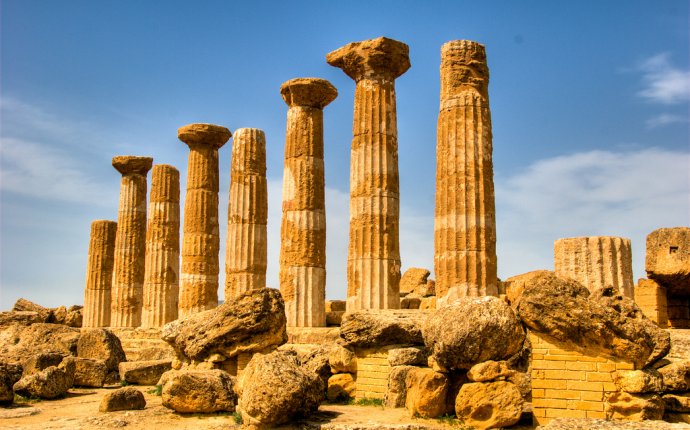
Fact About the Golden Age of Greece
Supporting pillars in female form hold up the Erechtheoin porch in Athens.
Courtesy MacGillivray Freeman Films
The “golden age” of Greece lasted for little more than a century but it laid the foundations of western civilization. The age began with the unlikely defeat of a vast Persian army by badly outnumbered Greeks and it ended with an inglorious and lengthy war between Athens and Sparta. This era is also referred to as the “Age of Pericles” after the Athenian statesman who directed the affairs of Athens when she was at the height of her glory.
During this period of time significant advances were made in a number of fields including government, art, philosophy, drama and literature. Some of the Greek names most familiar to us lived in this exciting and productive time. It was an era marked by such high and diverse levels of achievement that many classical scholars refer to the phenomenon as “the Greek miracle”. Even those who don't believe in miracles will concede that it is possible that the ever-competitive Greeks were spurred on to higher levels of innovation in their field by seeing the bar being raised in so many other areas.
None of this would have happened without an encouraging environment and Athens was at that time at the “top of her game”. Her citizens were supremely confident, filled with energy and enthusiasm and utterly convinced that their city provided what a combined London - Paris - New York might offer today.
Military victory over the Persians, largely achieved under Athenian leadership, set the stage. The transition in government from the reluctant hands of the aristocratic elite into the mass of common people also played an important role. More people felt that their opinions mattered than ever before.
The theatre in Delos, where a whisper from center stage easily reaches the back row.
Courtesy MacGillivray Freeman Films
One of the greatest inventions of the ancient Greeks was drama. It evolved out of religious ritual and promptly proved to be both an enduring and popular creation. Greek tragedies, featuring historical and mythological events, were written and directed by authors such as Aeschylus, Sophocles and Euripides. (Many feel that only Shakespeare merits inclusion in their company.) Each won numerous prizes and critical acclaim and each added innovations to the field of drama.
The lyric poet Pindar ushered in the era and became famous in his lifetime for victory odes written to celebrate athletic success. The writers of prose also flourished. Herodotus, regarded as the father of history, wrote several illuminating books on the Persian wars (and is still a often consulted source on ancient Egypt). Another war historian, Thucydides, is still admired as a lucid and evocative writer. Plato, whose writings largely survive, is said to have penned the most poetical prose since the Bible.
The golden age gave us Socrates who steered philosophy in the direction of morals, logic and ethics. His life, and the manner of his death, had a massive impact on other major figures of that epoch such as Plato, Aristophanes and Xenophon.